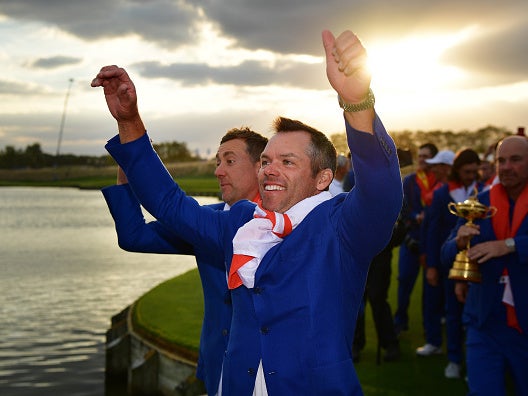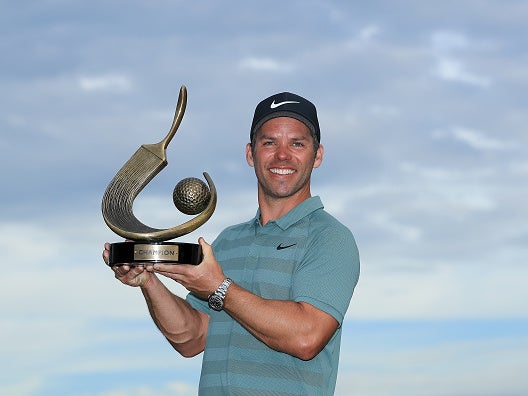Paul Casey: 'I'd be a hypocrite if I was paid to be in Saudi Arabia. Anybody who says sport isn't political, that's rubbish'
Exclusive interview: Paul Casey reflects on his renaissance, the Ryder Cup, his work with Unicef and snubbing Saudi Arabia

Your support helps us to tell the story
From reproductive rights to climate change to Big Tech, The Independent is on the ground when the story is developing. Whether it's investigating the financials of Elon Musk's pro-Trump PAC or producing our latest documentary, 'The A Word', which shines a light on the American women fighting for reproductive rights, we know how important it is to parse out the facts from the messaging.
At such a critical moment in US history, we need reporters on the ground. Your donation allows us to keep sending journalists to speak to both sides of the story.
The Independent is trusted by Americans across the entire political spectrum. And unlike many other quality news outlets, we choose not to lock Americans out of our reporting and analysis with paywalls. We believe quality journalism should be available to everyone, paid for by those who can afford it.
Your support makes all the difference.Sitting in the bar of Chapultepec Golf Club in Mexico, Paul Casey can’t help but break into cheer as he reflects on his middle-aged renaissance. In 2018, the Cheltenham-born 41-year-old returned to the PGA Tour’s winner circle for the first time in nine years and played a pivotal role in his first Ryder Cup since 2008. Standing alongside Tyrrell Hatton on the 18th green at Le Golf National, the emotions, usually shielded behind a pair of tinted sunglasses, began to spill over. “I normally cry at Finding Nemo,” he says, breaking into laughter. “Not on the golf course.”
As his caddie, John McLaren, skips out in a white bib to inspect morning conditions at the WGC Championship, you get the sense that behind Casey’s fiercely competitive streak – which he hastens to add is as strong as ever – he’s savouring every moment of this purple patch.
He is currently ranked No 22 in the world. The only two players his senior in the top 50 are Tiger Woods and Phil Mickelson, and less than a fortnight ago, Casey and Mickelson were going toe-to-toe in the final round at Pebble Beach. He’s practising less, aching more, sometimes having to stretch for half-an-hour before he can even swing the club properly, yet he’s playing some of the best golf of his career.
The biggest headlines surrounding Casey, though, since the turn of the year came in his action away from the course, when he withdrew from the European Tour’s maiden event in Saudi Arabia. Where many of the world’s top players accepted seven-figure participation fees, Casey – a Unicef ambassador – cited concerns over the country’s human rights abuses and was widely praised for taking a bold stance. He reflects on the decision earnestly and with self-awareness, admitting it’s an awkward topic to broach considering many of his close friends partook.
“It just didn’t sit well with me,” he says, after a moment’s deliberation. “I’ve not talked too much about it and I’m not sure I want to, but certainly signing a deal and being paid to be down there,” he pauses again. “I would be a hypocrite if I did that.
“Anybody who says sport isn’t political, that’s rubbish, sport is very political and we’ve seen it through the years. I’m glad I took a stance, more so if it highlighted the issues within the region, especially next door in Yemen.”
On Casey’s request, he is regularly sent reports by Unicef about their work in the region. “I’ve seen the numbers,” he continues. “In Yemen, in particular, 22m people facing starvation, 11.5m kids. I didn’t want anything I do to get in the way of a great organisation like Unicef.
“Where some of these guys are in the world rankings, they were there for the money, we all know that. But I wouldn’t take anyone to task over it. Crikey, they’re my mates, it just didn’t feel right for me.”
Until last year, there was a sense of yesterday’s man about Casey. After competing in three successive Ryder Cups from 2004-2008 and climbing to No 3 in the world rankings, he suffered ebbs and flows in form, faltering Sunday finishes, and steadily detached himself from the European Tour.
He’s spent the best part of the last two decades living in Arizona, as evidenced by a lasting tan – although he’s forgone the southern twang – and much like Rory McIlroy, in some quarters, the transatlantic migration was maligned.

But when Thomas Bjorn approached Casey at the 2017 Open and told him: “I want you to be part of my Ryder Cup team. I need you to rejoin the European Tour,” a renaissance began.
The pair plotted out every event Casey would play over the next season, before he ended his PGA Tour drought at the Valspar Championship and ground out top-ten finishes in the latter half of the season to justify his selection.
“Honestly, I’d thought I might never be able to play in the Ryder Cup again. My last full point was in 2006 at the K Club when I beat Jim Furyk,” he laughs. “It was a bloody long time.”
The pride seeps into his voice as he talks about the exploits at Le Golf National. “That was the most amazing experience I’ve ever had on a golf course. It’s tricky to describe, I mean, it just doesn’t get any better, does it? How can it?
“The friendships I built that week, I’ll have forever. We still reminisce about it together till this day. The WhatsApp group is still going. It’s still highly abusive and if our phones ever got hacked we’d probably go to jail,” he says, bursting into laughter once more. “I don’t know where half these guys get their material from, but it’s disturbing, to be honest. Sergio [Garcia] got reamed by us for his Saudi incident, nobody is immune to humour. It’s so cool.

“It was probably my last European based Ryder Cup but it’s such a drug, it’s such an addictive feeling to be part of it. I still use a Ryder Cup ball marker till this day, I’ve got it in my pocket right now,” he chuckles, recalling how he placed the marker in Bubba Watson’s line when the pair were playing together earlier this year. “The team is extremely close. Golf can be so individual and it can be a lonely sport sometimes, but it doesn’t feel like it.”
On the back of a year where everything came full-circle, there’s a distinct cheerfulness to Casey. He has had one of the best golfing years of his life, his son is set to start school next year and he’s relishing balancing his role as a “full-time taxi service”.
Once a big-hitter, he gawks at the likes of McIlroy pitching a 394-yard drive onto the green on the par-4 and is under no illusion that he will be able to keep up with the younger breed forever. “I ache, I hurt. I can’t move the way I used to,” he says, as he notes the soreness in the thighs. “Phil [Mickelson] is still so flexible, I saw a video where he does a kick over Zach Johnson’s head,” he says. “I can’t even remember the last time I touched my toes.”
For now, though, Casey is right there with them, still desperate to win the maiden major that has eluded him thus far. But, above all, as he prepares to wander off and find McLaren testing yardages on the course, he is content.
“To still be doing it at this age, when a lot of people have come and gone. There’s not a lot of guys doing it in their 40s and there’s an incredible satisfaction to that.”
Join our commenting forum
Join thought-provoking conversations, follow other Independent readers and see their replies
Comments